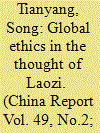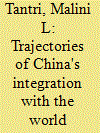| Srl | Item |
| 1 |
ID:
122641


|
|
|
|
|
| Publication |
2013.
|
| Summary/Abstract |
The thought of Laozi is of paramount importance in Chinese traditional culture. It is significant for us to discover some meaningful factors in Laozi's ideological systems in order to expand and strengthen China's soft power. Coincidently, there exists something in common between the thought of Laozi and ethics in Western political philosophy. The comparison of these ethical views of different value systems would help in better understanding the advantages of Chinese traditional culture in the process of China's soft power construction. This essay tries to summarise some common factors between the thought of Laozi and Western global ethics that can contribute to the construction of China's soft power. This could in turn offer an approach to establishing a 'Chinese school' in international political theories as well as contribute to global ethics architecture. This essay has been divided into three sections. The first discusses global ethics in Western political philosophy while the second investigates global ethics in Laozi's ideological system and then makes a contrast between Laozi's global ethics and those in Western political philosophy. In the final section, some fundamental principles in China's soft power construction will be explored.
|
|
|
|
|
|
|
|
|
|
|
|
|
|
|
|
| 2 |
ID:
122639


|
|
|
|
|
| Publication |
2013.
|
| Summary/Abstract |
There were great differences between Indian and Chinese positions on the UN peacekeeping operations during the Cold War. India played a pioneering role both in the conceptualisation and consolidation of the peacekeeping mechanism. On the other hand, China vehemently opposed the UN peacekeeping operation as a tool of imperialism even after joining the United Nations in 1971. Both India and China are apprehensive of motivation of the Western enthusiasm for complex peacekeeping operations of the post-Cold War and both expressed strong reservation on number of issues arising from them. As they do not want to be marginalised hence, despite their reservations, they individually participated actively in the operations with the intention of making a difference through participation. The differences in their participation are partly due to vast experience and confidence of India and partly due to hesitancy of China to engage in new terrain. They have taken similar positions to strengthen UN peacekeeping such as advocating for stronger financial resources, participation of the troop contributing countries in the decision-making process, favouring standby forces, opposing a selective approach and effective training of peacekeepers. Their participation in peacekeeping operations is no longer just a means to prevent Western powers from misusing peacekeeping operations. Different motives and incentives appear to be driving India and China's participation in the peacekeeping operations.
|
|
|
|
|
|
|
|
|
|
|
|
|
|
|
|
| 3 |
ID:
122640


|
|
|
|
|
| Publication |
2013.
|
| Summary/Abstract |
By exploring the role of Special Economic Zones (SEZs) in China's integration with the world economy, we also investigate the underlying challenges faced by the economy. This analysis suggests that SEZs enabled the Chinese economy to trigger its growth standards and to achieve its ambition of integrating with the world economy without compromising its political ideology. This transformation, however, has been accompanied by a few challenges of late that have been posing obstacles to the broader process of development. We argue that the experience of Chinese SEZs provides a number of policy directions for other economies, which may be followed with discrimination.
|
|
|
|
|
|
|
|
|
|
|
|
|
|
|
|